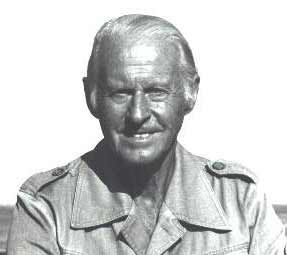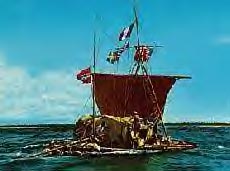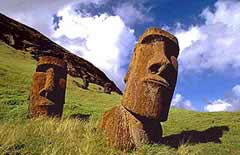|
In the wake of Thor Heyerdahl's death, I have had the time to think about how faithful I have been in emulating my idol. I fear that I would get only an average grade living up to his standards. Perhaps, this accounts for my packing in great adventures now. Maybe I am doing a full-court press knowing that I don't have a lifetime to imitate his living life to its fullest. Life is finite, therefore, we have a short period of time to enjoy the adventure of life.
Heyerdahl's Aku-Aku chronicled his expedition to what we call Easter Island-the most remote island in the South Pacific. It lays off the coast of Chile about 2200-miles. While on the island called by the natives, Rapa Nui, he did extensive research on the great monolith faces. The world of science owes Thor Heyerdahl a great debt for his inquisitiveness and determination while pushing the envelope of exploration. I count myself among the millions of ordinary people who he captivated with his words about his deeds. When I set foot upon Easter Island this year, I will remember with reverence that Norwegian explorer who took a teenager and enthralled him with accounts of his adventures. It has taken me a lifetime to get to the places about which I read while bored with school, but my dreams of exploring Easter Island are now coming together. Heyerdahl will be immortal because of his explorations of faraway places like Easter Island and Tahiti. However, his greatest contribution was not to science, but to the explorations of the inner sea of the mind. He has shown us how to journey inward to the oceans of our imagination. As long as humankind is willing to follow in Heyerdahl's steps, he will live forever. Thank you, Thor. You gave me a sense of adventure and a longing for the sea of dreams and showing me how to realize them.
|







 The man that roamed the oceans is dead. The sail of the Kon-Tiki man has
finally been hauled down for the last time. Never again will that dashing
Norwegian, Thor Heyerdahl, set his sail for adventure-except in the minds of
millions like me who grew up vicariously dreaming dreams of exploration. When I
heard of his death, I thought that it was ironic that he died as I prepared for
my trip retracing some of his journeys a half century ago.
The man that roamed the oceans is dead. The sail of the Kon-Tiki man has
finally been hauled down for the last time. Never again will that dashing
Norwegian, Thor Heyerdahl, set his sail for adventure-except in the minds of
millions like me who grew up vicariously dreaming dreams of exploration. When I
heard of his death, I thought that it was ironic that he died as I prepared for
my trip retracing some of his journeys a half century ago.  I first met Heyerdahl when I was in high school. We had to do book
reports back
then. Fortunately, I came across Kon-Tiki. It recounted Heyerdahl's
voyage from Peru to Polynesia to prove that it was possible that some of the
South Sea Islands in Oceania could have been populated by South American
explorers. His 4300-mile voyage took him more than three months to accomplish.
Along the way, there were moments of heart-stopping terror and times of great
contentment. He had not only proven that primitive peoples living in South
America could have transversed the Pacific and populated many of the islands,
but he also proved that he was a man of courage and determination. Having
lived through his first voyage via the pages of Kon-Tiki, I dove into his
next book, Aku-Aku.
I first met Heyerdahl when I was in high school. We had to do book
reports back
then. Fortunately, I came across Kon-Tiki. It recounted Heyerdahl's
voyage from Peru to Polynesia to prove that it was possible that some of the
South Sea Islands in Oceania could have been populated by South American
explorers. His 4300-mile voyage took him more than three months to accomplish.
Along the way, there were moments of heart-stopping terror and times of great
contentment. He had not only proven that primitive peoples living in South
America could have transversed the Pacific and populated many of the islands,
but he also proved that he was a man of courage and determination. Having
lived through his first voyage via the pages of Kon-Tiki, I dove into his
next book, Aku-Aku. 